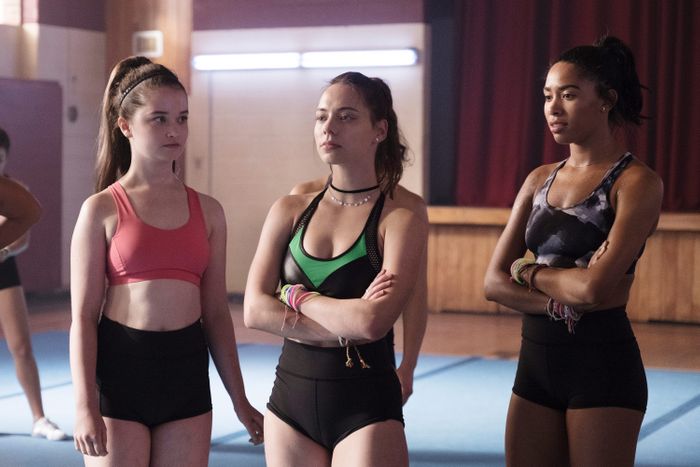
It’s 2020, and it’s time to officially retire the term Peak TV as a description for the current television landscape. We’re now living in the era of Avalanche TV, where network, cable, and streaming options are bombarding us so rapidly, from so many sides, that it seems likely we will be crushed under the weight of it all. Only in Avalanche TV World could there be two new shows about cheerleading, a sport that rarely inspires mainstream works of television — and only in Avalanche TV World could both of them also be great, but completely different, and also entirely unaffiliated with the Bring It On franchise.
The two shows are Dare Me, the new USA mystery-thriller centered on an Ohio high-school squad, and Cheer, a Netflix docuseries premiering today, which follows a championship community-college team attempting to win big again at an annual national competition in Daytona. The former series is a smart and soapy noir work about the tensions between teenage girls, as well as an adult coach who still behaves like a teenage girl. The latter is an earnest video journal about the challenges this dangerous sport poses and how the men and women who have made that sport the center of their lives rise to meet them.
Each series possesses its own sensibility and sense of purpose, but both of them take cheerleading seriously and demonstrate the degree of physical sacrifice required to be truly competitive in that arena. If you’ve been on a cheerleading, pom, or dance squad at any point in your life (hand raised), you already know that it’s a lot more than wearing short skirts and “rah-rah”-ing on the sidelines. It’s an enormous time commitment and, especially in competitive cheer and dance, a major tax on the body. “At least football players wear helmets,” remarks a doctor in Dare Me while treating an injured cheerleader. Cheer makes it even more clear that the threat of devastating pain or impairment looms over every pyramid and basket toss.
But while Dare Me — co-created by veteran TV writer Gina Fattorre and author Megan Abbott, who wrote the novel on which the series is based — gets at the intensity of the sport, it’s more interested in relationship dynamics and dark secrets than the daily grind of practice. From the opening moments of the series, which debuted on USA on December 29 and will roll out a new episode every Sunday, it is clear that some sort of life-altering, potentially criminal incident is going to take place. But Dare Me takes its time to reveal what that incident entails, and how the primary characters will be affected by it.
The two extremely co-dependent best friends at the center of Dare Me are Addy (Herizen Guardiola of The Get Down) and Beth (Marlo Kelly), who is captain of the cheerleading squad at Sutton Grove High School until a new hotshot coach, Colette French (Willa Fitzgerald, who played Kitsey in The Goldfinch and Emma on MTV’s Scream), shows up to whip her girls into shape and send them to regionals for the first time. Colette immediately eliminates the captain position and decides that Beth doesn’t necessarily need to be top girl, i.e. the talented squad member who gets to stand at the highest point of the pyramid. Colette also takes a shine to Addy, treating her like a mentee but also a confidante in ways that become increasingly inappropriate and drive a wedge between Addy and Beth.
In her fiction, Abbott has demonstrated a gift for capturing the tango that often takes place in close female friendships in which both parties are ambitious. Abby revels in the intimacy she has with Beth and with Colette. There are numerous scenes that linger on the physical proximity between both sets of women, holding on the sight of fingers brushing against fingers or a hand grasping for the other’s hand in a way that stops just short of being sexual. It’s clear that Abby, Beth, and maybe Colette, too, gain energy and confidence from the sense of acceptance they feel within the bubble of these connections.
But there’s also a sense of mistrust and jealousy that oozes into the space between them. Beth, the bad girl with the lack of parental supervision, becomes more threatened by and suspicious of the connection between Colette and Addy, and for good reason. In a breakout performance, Kelly gives Beth a physicality that suggests she is double-dog-daring everyone and anyone to mess with her. The girl has Resting Don’t Fuck With Me Face. But Kelly also reveals a vulnerability in Beth that implies she’s more damaged than truly rebellious, and perhaps even more ethical than the seemingly decent Addy.
Addy — who, like many teenage girls, alters her behavior to suit whomever she wants to impress — becomes Colette’s babysitter and gets drawn into the drama surrounding the coach’s extramarital affair with Will (Zach Roerig), an Army recruiter at the high school. Abbott, Fattore, and the other writers take their time to lay out all these bread crumbs and others so that we know these characters are being led toward some sort of disaster. We don’t get a full sense of what that disaster is until episode seven of the first season’s ten. Rather than being frustrating, that sense of mystery acts like a magnet that keeps pulling the viewer back into Dare Me’s orbit.
So does the hypnotic, ominous approach to the filmmaking. Dare Me frequently downshifts into slow motion to capture uniform-clad bodies flying through the air or kids hanging out at hastily planned parties in the woods. There’s a dreamy quality to the series that conveys the notion that everyone in this Ohio town is in a haze, going through motions, walking toward destinies they can’t avoid. It’s reminiscent of another teen series, Euphoria, which airs on HBO, the premium-cable network that passed on Dare Me. Having both shows on that network probably would have felt somewhat redundant. Like the Zendaya drama, Dare Me is not shy about showing us underage kids ingesting all kinds of substances. The members of the Sutton Grove cheerleading squad also clearly graduated from the Euphoria School of Cosmetology with a concentration in glitter-eyeshadow application. But Dare Me is much more plot-driven and structured than Euphoria. I’m glad there’s room for both of them, and I hope there continues to be room for Dare Me, since its finale practically left me screaming for more episodes.
I’m also glad there is room for a show like Cheer, which stands at the tonally opposite end of the spectrum from Dare Me. As a docuseries, it’s all fly-on-the-wall realness rather than dreamy slo-mo. And while it depicts plenty of conflicts and disagreements between the cheerleaders at Navarro College in Corsicana, Texas, it’s an ultimately more uplifting show that uses cheer as a prism through which to explore overcoming all kinds of obstacles. Basically, it’s Friday Night Lights, but about cheerleading instead of football.
Cheer’s Coach and Mrs. Coach is Monica Aldama, the head of the Navarro squad who rules her kids with a firm hand and a loving heart, while regularly rocking a slick pair of suede boots. A conservative Christian and family woman, Aldama, like so many of the people in this terrific series, doesn’t conform to stereotypes. When she talks about the gay men on her coed squad, for example, she makes it clear that she doesn’t share the anti-LGBTQ views of many of her fellow churchgoing citizens. “I will debate you up one side and down the other if you talk about my boys,” she says. This is probably obvious, but if Cheer gets adapted into a scripted series — what, there’s room for a third cheerleading show in the age of Avalanche TV — she absolutely has to be played by Connie Britton. If Britton’s not available, maybe Sheryl Crow. Aladama looks a lot like Sheryl Crow.
Over the course of the six episodes, you will fall in love with Aldama and several of the young adults on her squad who have come from all over the country and, in several cases, overcome difficult childhoods to find their people and their purpose on this community college team. My personal favorite is Jerry, the relentlessly positive and supportive squad member who always just misses getting on mat, a.k.a. having the opportunity to perform in competition, but keeps on smiling and trying no matter what. All you want to do is hug that kid, along with several of his peers who, like Jerry, have either lost birth parents or been abandoned by them.
When you don’t want to hug these kids, you definitely want to take them to the hospital. In the brief 68-day window of time that Cheer depicts, multiple injuries are sustained: concussions, which are a regular occurrence; fractured elbows; thrown-out backs. What’s spectacular about the series is how unflinchingly it depicts the hard work that goes into cheer: the long hours, the amount of muscle and grace it requires, the exhaustion and the very real sense of danger that cheerleaders put themselves in at every single game, competition, or practice. These kids do high-stakes trust falls multiple times every day while wearing no padding of any kind. If no one is there to catch you after you’ve been tossed many feet into the air — and that does happen — you could very easily break your neck. In any team sport, it’s important for all of the members to work together toward a common purpose. But in cheer, working together is legitimately a matter of life and death.
In that way, Dare Me and Cheer convey the same message, just in different contexts: As soon as you can’t rely on the people around you to provide support, everything in your world very well may crumble to the ground.



